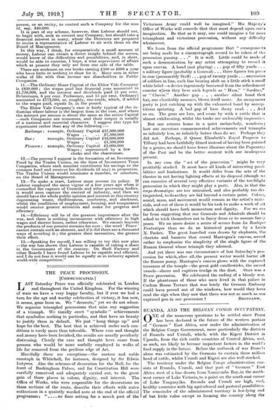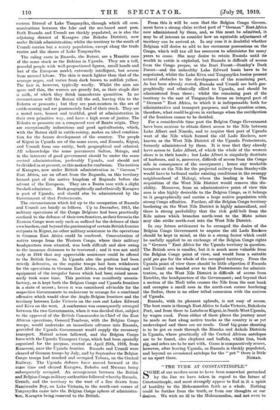RUANDA, AND THE BELGIAN CONGO OCCUPATION.
ONE of the numerous questions to be settled since Peace has been declared is the future of the western portion of " German " East Africa, now under the administration of the Belgian Congo Government, more particularly the districts of Ruanda and Urundi, which, with the Kigezi District in Uganda, form the rich cattle countries of Central Africa, and, as such; are likely to become important factors in the world's food supply in the future. Before the outbreak of war Ruanda alone was estimated by the Germans to contain throe million head of cattle, whilst Urundi and Kigezi are also well stocked.
The territory under the Belgian Congo administration con- sists of Ruanda, Urundi, and that part of " German " East Africa west of a line drawn from Namirembe Bay, in the south- west corner of Lake Victoria, to a point on the south-east corner of Lake Tanganyika. Ruanda and Urundi are high, cool, healthy countries with big agricultural and pastoral possibilities. The remainder of the administered territory is low-lying and of but little value except as forming the country along the eastern littoral of Lake Tanganyika, through which all com- munications between the lake and the sea-board must pass. Both Ruanda and Urundi are thickly populated, as is also the adjoining district of Karagwe (the Bukoba District), now under British administration; whilst the territory to the south of Urundi carries but a scanty population, except along the trade routes and the shores of Lake Tanganyika.
The ruling caste in Ruanda, the Batusi, are a Hamitic race of the same stock as the Bahima in Uganda. They are a tall, graceful people with well-proportioned figures, small hands and Feet of the European model, extremely intelligent, but averse from manual labour. The skin is much lighter than that of the average negro, and varies from dark brown to reddish yellow. The hair is, however, typically woolly. Whilst the men are spare and thin, the women are grossly fat, as their staple diet is milk, of which they drink immoderate quantities. In no circumstances will the Batusi till the soil, leaving this to the Bahutu or peasants ; but they are past-masters in the art of cattle-rearing and are passionately fond of their stock. They are a moral race, honest and truthful, good at administration in their own primitive way, and have a high sense of justice. The Bahutu or peasants are a conquered race of Banta origin. They are exceptionally industrious and good agriculturists, which, with the Batusi skill in cattle-raising, makes an ideal combina- tion for the future development of the country. The people of Kigezi in Uganda are of the same races, and Ruanda, Kigezi, and Urundi form one entity, both geographical and ethnical. All acknowledge the same paramount Sultan, Msinga, and in the interests of good government should be under the same central administration, preferably Uganda, and should not be divided m at present, as this makes for confusion. The natives of Karagwe, now under British administration in "German" East Africa, are an off-set from the Baganda, as this territory formed part of the native kingdom of Buganda before the advent of the European. They are a Bantu race with a slight Swaheli admixture. Both geographically and ethnically Karagwe is part of Uganda, and should also be administered by the Government of that Protectorate.
The circumstances which led up to the occupation of Ruanda and Urundi are briefly as follows. Up to December, 1915, the military operations of the Congo Belgians had been practically confined to the defence of their own frontiers, as their forces in the Eastern Congo were only such as sufficed for the defence of their own borders, and beyond the garrisoning of certain British frontier outposts in Kigezi, no other military assistance to the operations in German East Africa could be rendered. Concentration of native troops from the Western Congo, where their military headquarters were situated, was both difficult and slow owing to the immense distances to be traversed ; and it was not until early in 1916 that any appreciable assistance could be offered to the British forces. In Uganda also the position had been strictly defensive, as the regular troops had been withdrawn for the operations in German East Africa, and the training and equipment of the irregular forces which had been raised neces- sarily took some time. This position was manifestly unsatis- factory, as it kept both the Belgian Congo and Uganda frontiers in a state of unrest ; hence it was considered advisable for the respective Governments to endeavour to arrange for a combined offensive which would clear the Anglo-Belgian frontiers and the territory between Lake Victoria on the east and Lakes Edward and Kivu on the west. A conference was consequently arranged between the two Governments, when it was decided that, subject to the approval of the British Commander-in-Chief of the East African operations, General Toinbeur, with the Belgian Congo troops, would undertake an immediate advance into Ruanda, provided the Uganda Government would supply the necessary transport. Mutual action followed, and the Belgian Congo force with the Uganda Transport Corps, which had been specially organized for the purpose, started on April 25th, 1916, from Kamwezi, near the Uganda frontier. Ruanda and Urundi were cleared of German troops by July, and by September the Belgian Congo troops had reached and occupied Tabora, on the Central Railway. The Uganda defence force moved forward at the same time and cleared Karagwe, Bukoba and Mwanza being subsequently occupied. An arrangement between the British and Belgian Congo military authorities followed whereby Ruanda, Urundi, and the territory to the west of a line drawn from Namirembe Bay, on Lake Victoria, to the south-east corner of Tanganyika came into the Belgian Congo sphere of administra- 'ion, Karagwe being reserved to the British. From this it will be seen that the Belgian Congo Govern_ ment have a strong claim to that part of "German" East Africa now administered by them, and, as this must be admitted, it may be of interest to consider how an equitable adjustment of territory can be arrived at. In any case it is doubtful whether Belgium will desire to add to her enormous possessions on the Congo, which will tax all her resources to administer for many years to come. She may desire to retain Ruanda until its wealth in cattle is exploited, but Ruanda is difficult of access from the Congo proper, as the Ituri Forest—Stanley's Dark Forest—and the unhealthy Lake Edward basin have to be negotiated, whilst the Lake Kivu and Tanganyika basins present natural obstacles to the development of the remaining part. As has been already stated, Ruanda and Urundi are both geo- graphically and ethnically allied to Uganda, and should be administered from there ; whilst the remaining part of the territory to the east of Tanganyika forms an integral part of " German " East Africa, to which it is indispensable both for administrative and transport purposes, and the question arises, therefore, what could be given in exchange when the rectification of the frontiers comes to be decided.
For a considerable time past the Belgian Congo Government have been anxious to obtain direct access to the Nile between Lake Albert and Nimule, and to acqUire that part of Uganda west of the Nile which formed the old Lado Enclave, now known as the West Nile District of the Uganda Protectorate, formerly administered by them. It is true that they already have access to Lake Albert, of which the whole of the western shore is in their hands ; but Lake Albert is singularly destitute of harbours, and is, moreover, difficult of access from the Congo side in consequence of the escarpment ; hence any workable terminus on the Nile for the projected railway from Stanleyville would have to be found under existing conditions in the swampy neighbourhood of Mahagi, where the landing is bad. The acquisition of the West Nile District would remove this dis- ability. Moreover, from an administrative point of view this area is also highly desirable to the Belgian Congo, as it belongs to it geographically and carries a large native population with strong Congo affinities. Further, all the Belgian Congo territory bordering on the West Nile District is highly mineralized, and there is strong probability that the rich gold-belt from the Kilo mines which branches north-west to the Moth mines may also strike north-east into the West Nile District.
In any future settlement to be arranged the desire of the Belgian Congo Government to acquire the old Lads Enclave should be kept in mind, as this is a strong factor which could be usefully applied to an exchange of the Belgian Congo rights in " German " East Africa for the Uganda territory in question. The British area is smaller, but it is much more valuable from the Belgian Congo point of view, and would form a suitable quid pro quo for the whole of the occupied territory. From the Uganda point of view there should be little objection if Ruanda and Urundi are handed over to that Protectorate for adminis- tration, as the West Nile District is difficult of access from Entebbe, the headquarters of the Government; and beyond that a section of the Madi tribe crosses the Nile from the east bank and occupies a small area in the north-east corner bordering the Sudan, there is no other tribal connexion with the natives of Uganda.
Mande, with its pleasant uplands, is not easy of access. The best route is through East Africa to Lake Victoria, Bukakata Port, and from there to Lutobo or Kigezi, in South-West Uganda, by wagon road. From either of these places the journey must be made on foot along native tracks as the country is as yet undeveloped and there are no roads. Good big-game shooting is to be got en route through the Masaka and Ankole Districts in Uganda, where practically all the Central African antelopes are to be found, also elephant and buffalo, whilst lion, bush pig, and zebra are to be met with. Game is comparatively scarce, however, after leaving Uganda, as Ruanda is thickly populated, and beyond an occasional antelope for the " pot " there is little



































 Previous page
Previous page